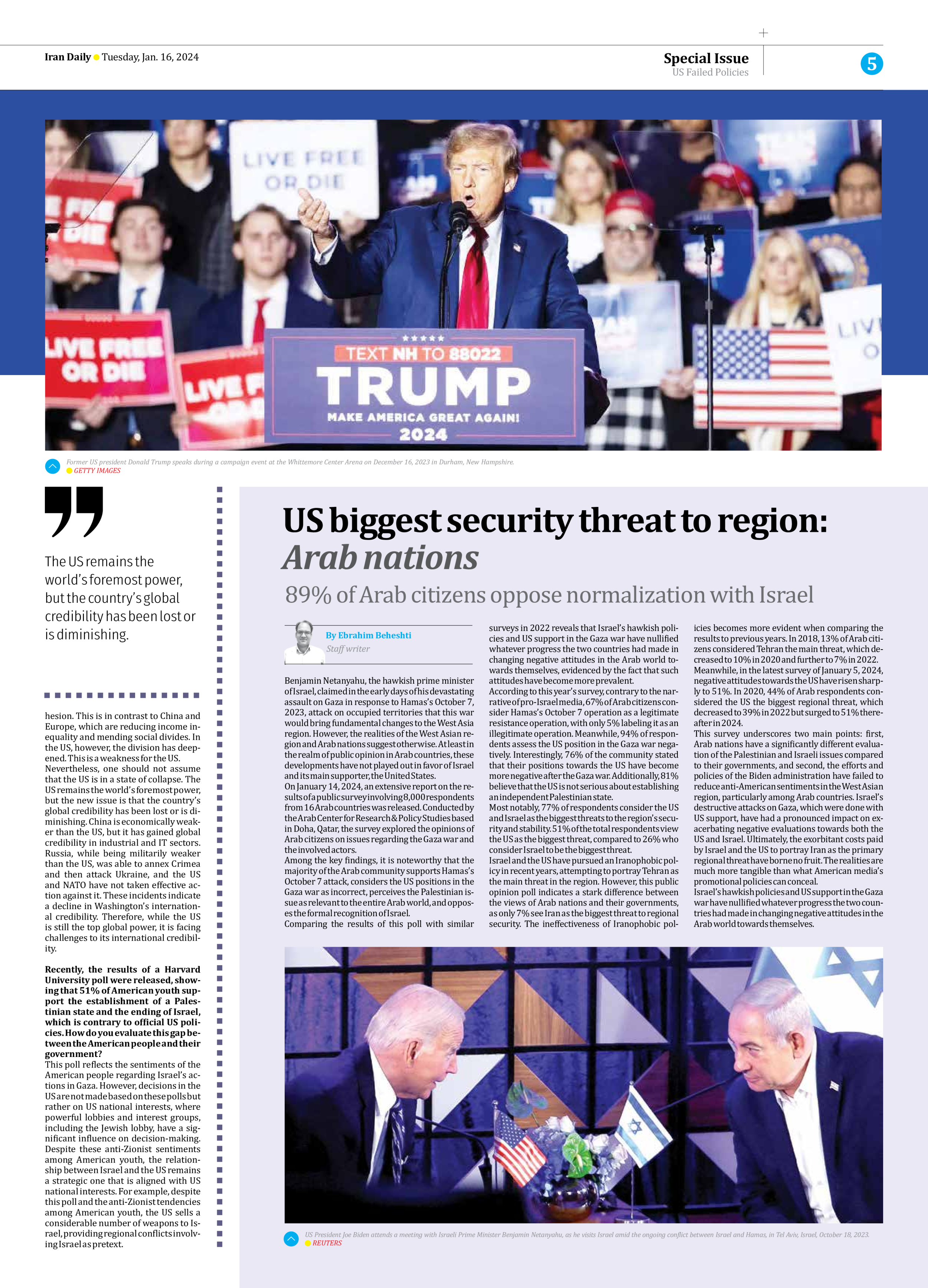
US biggest security threat to region: Arab nations
89% of Arab citizens oppose normalization with Israel
By Ebrahim Beheshti
Staff writer
Benjamin Netanyahu, the hawkish prime minister of Israel, claimed in the early days of his devastating assault on Gaza in response to Hamas’s October 7, 2023, attack on occupied territories that this war would bring fundamental changes to the West Asia region. However, the realities of the West Asian region and Arab nations suggest otherwise. At least in the realm of public opinion in Arab countries, these developments have not played out in favor of Israel and its main supporter, the United States.
On January 14, 2024, an extensive report on the results of a public survey involving 8,000 respondents from 16 Arab countries was released. Conducted by the Arab Center for Research & Policy Studies based in Doha, Qatar, the survey explored the opinions of Arab citizens on issues regarding the Gaza war and the involved actors.
Among the key findings, it is noteworthy that the majority of the Arab community supports Hamas’s October 7 attack, considers the US positions in the Gaza war as incorrect, perceives the Palestinian issue as relevant to the entire Arab world, and opposes the formal recognition of Israel.
Comparing the results of this poll with similar surveys in 2022 reveals that Israel’s hawkish policies and US support in the Gaza war have nullified whatever progress the two countries had made in changing negative attitudes in the Arab world towards themselves, evidenced by the fact that such attitudes have become more prevalent.
According to this year’s survey, contrary to the narrative of pro-Israel media, 67% of Arab citizens consider Hamas’s October 7 operation as a legitimate resistance operation, with only 5% labeling it as an illegitimate operation. Meanwhile, 94% of respondents assess the US position in the Gaza war negatively. Interestingly, 76% of the community stated that their positions towards the US have become more negative after the Gaza war. Additionally, 81% believe that the US is not serious about establishing an independent Palestinian state.
Most notably, 77% of respondents consider the US and Israel as the biggest threats to the region’s security and stability. 51% of the total respondents view the US as the biggest threat, compared to 26% who consider Israel to be the biggest threat.
Israel and the US have pursued an Iranophobic policy in recent years, attempting to portray Tehran as the main threat in the region. However, this public opinion poll indicates a stark difference between the views of Arab nations and their governments, as only 7% see Iran as the biggest threat to regional security. The ineffectiveness of Iranophobic policies becomes more evident when comparing the results to previous years. In 2018, 13% of Arab citizens considered Tehran the main threat, which decreased to 10% in 2020 and further to 7% in 2022.
Meanwhile, in the latest survey of January 5, 2024, negative attitudes towards the US have risen sharply to 51%. In 2020, 44% of Arab respondents considered the US the biggest regional threat, which decreased to 39% in 2022 but surged to 51% thereafter in 2024.
This survey underscores two main points: first, Arab nations have a significantly different evaluation of the Palestinian and Israeli issues compared to their governments, and second, the efforts and policies of the Biden administration have failed to reduce anti-American sentiments in the West Asian region, particularly among Arab countries. Israel’s destructive attacks on Gaza, which were done with US support, have had a pronounced impact on exacerbating negative evaluations towards both the US and Israel. Ultimately, the exorbitant costs paid by Israel and the US to portray Iran as the primary regional threat have borne no fruit. The realities are much more tangible than what American media’s promotional policies can conceal.
Israel’s hawkish policies and US support in the Gaza war have nullified whatever progress the two countries had made in changing negative attitudes in the Arab world towards themselves.







